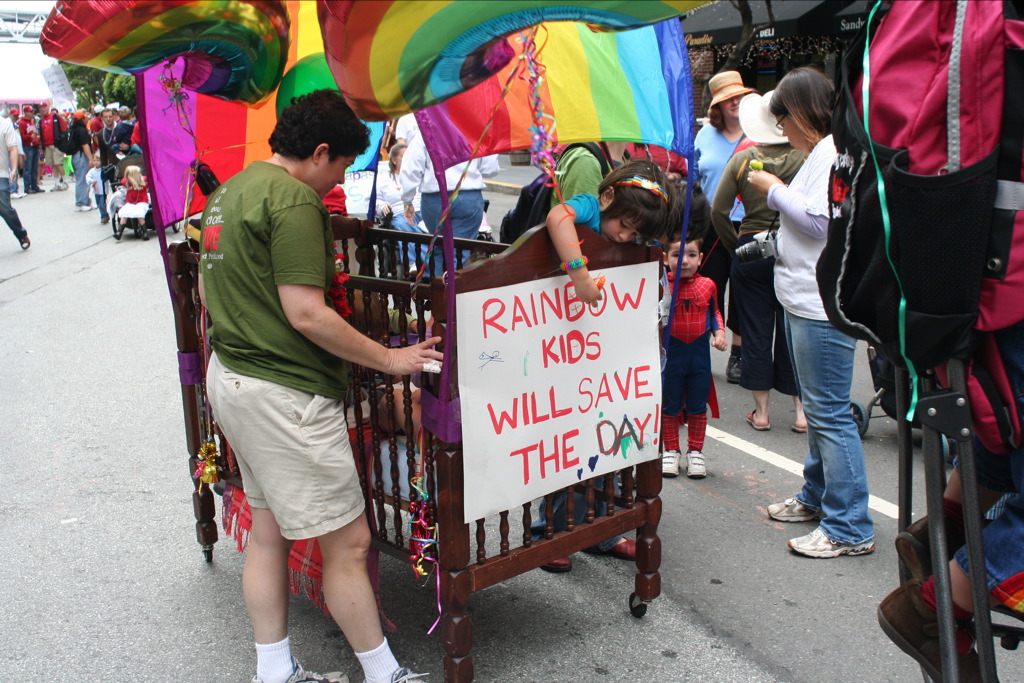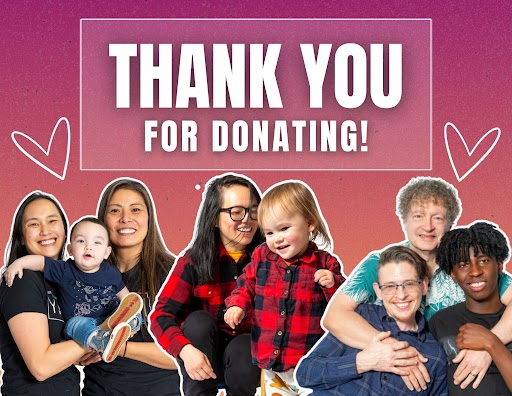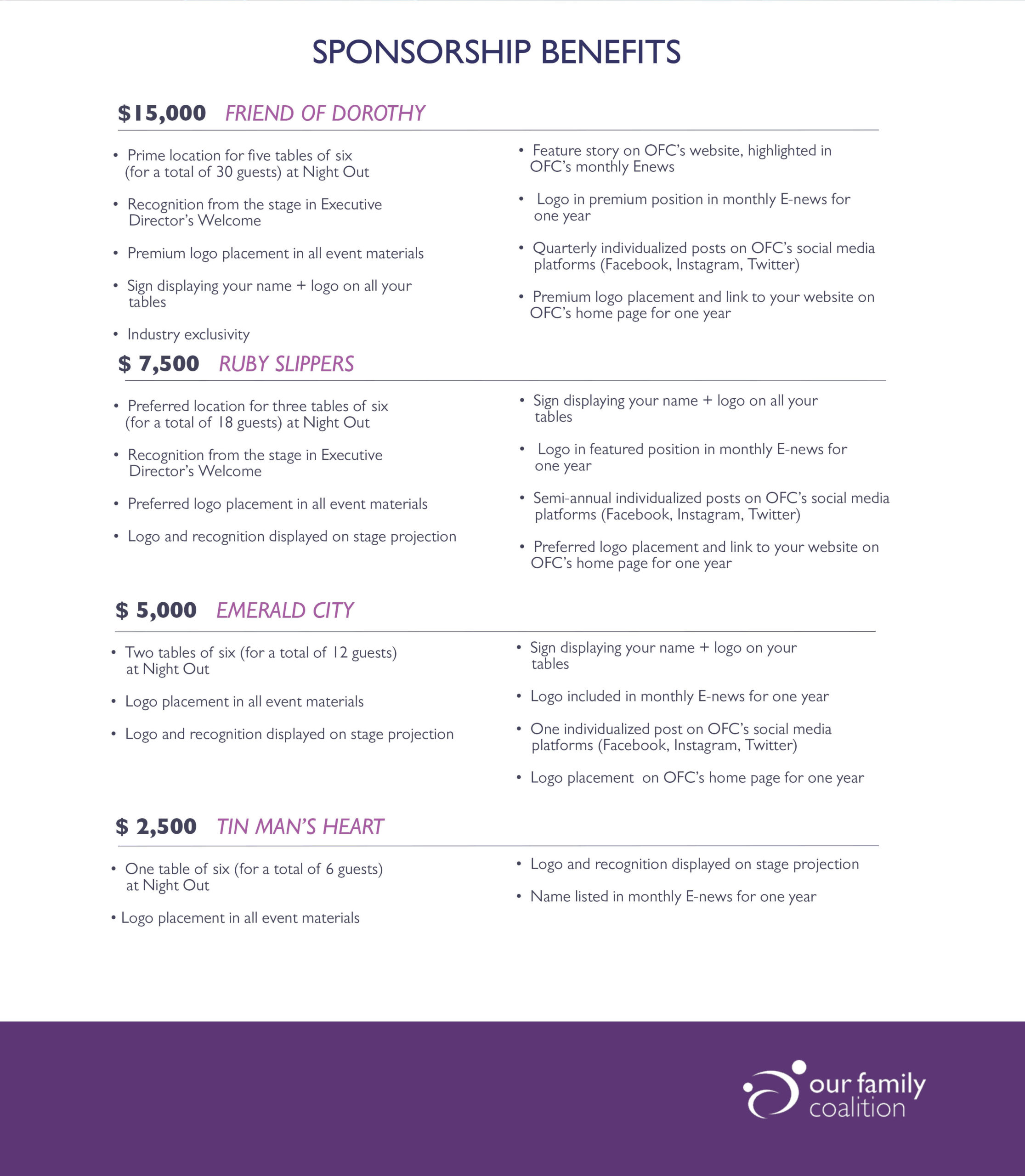by Polly Pagenhart, Communications Director at Our Family Coalition
This piece was originally published on the OFC Blog on June 24, 2014. It is re-posted here with current links for Pride 2019.
If this your first Pride with your family, you’re probably wondering how you’re going to get through the day with your good humor – and your wee charges – intact. And for good reason!
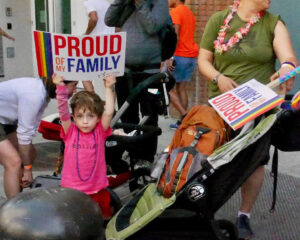 The downside of pride-as-a-parent: it’s not the same as when you were a footloose, fancy-free non-parent. The parade route covers nearly a mile and a half, which amounts to at least a half-hour walk on hard pavement even before you factor in the pre-parade wait and the stop-and-go of parading.
The downside of pride-as-a-parent: it’s not the same as when you were a footloose, fancy-free non-parent. The parade route covers nearly a mile and a half, which amounts to at least a half-hour walk on hard pavement even before you factor in the pre-parade wait and the stop-and-go of parading.
The pride-as-a-parent upside, especially if you march with the OFC contingent: it’s nothing short of transcendent, walking up Market Street with your whole family, watching your children be cheered on by rainbow flag-waving strangers like they’re astronauts returning from the moon. The supply of pride from that s/hero’s welcome lasts a year, and is well worth what you go through to enable your kids to experience it.
If you make it to the Family Garden (or go there directly), you’ll be greeted by a veritable sea of our families, safely frolicking inside our very own playground. We’ll have healthy snacks and beverages inside there, plus our own port-a-potties (not to be underestimated!). Also: balloon animals, face painting, story time, and play structure fun.
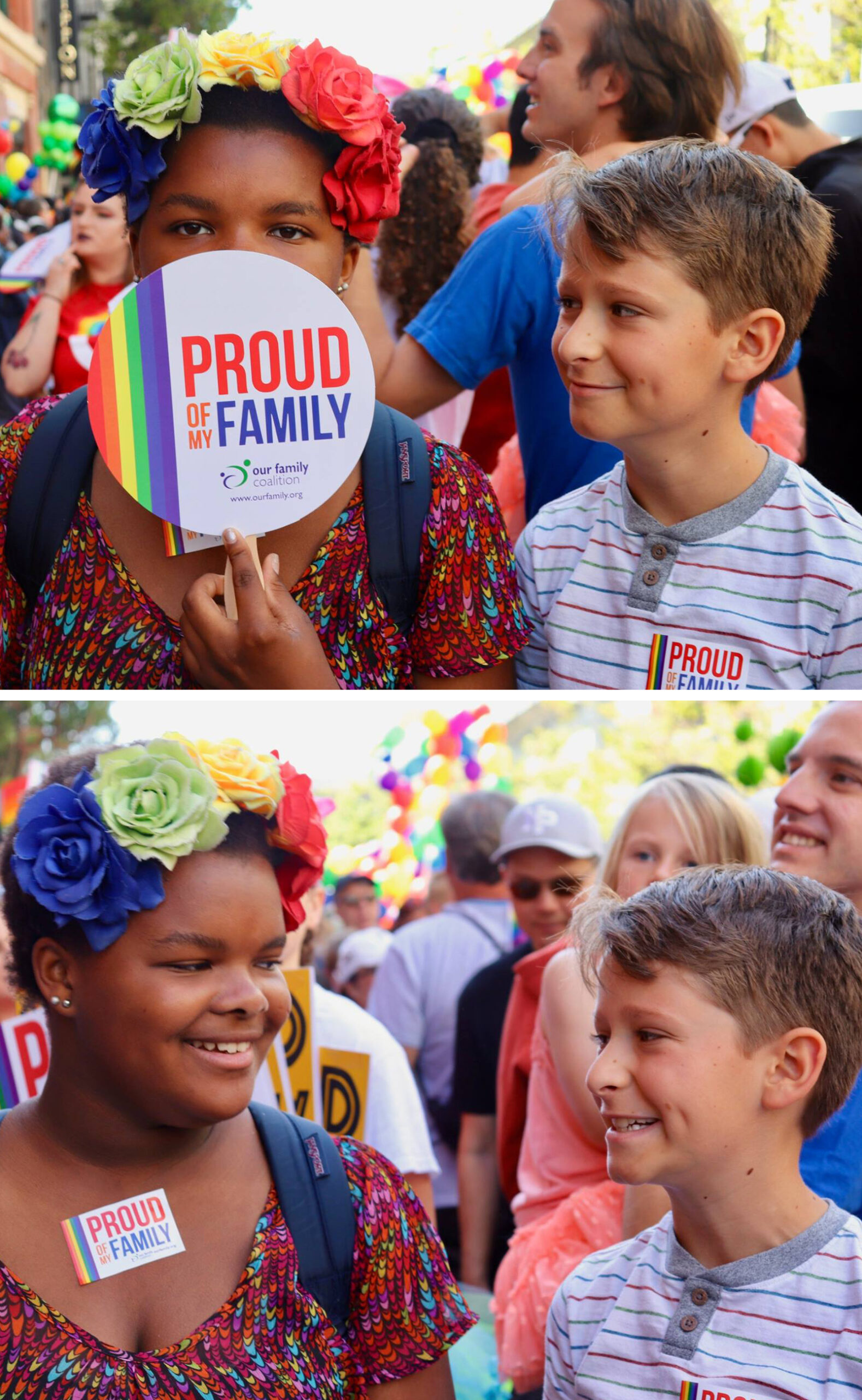 So! For all pride-rookie parents, here are five essential things to remember:
So! For all pride-rookie parents, here are five essential things to remember:
1. Bring food and water.
2. Bring wheels, if you can.
3. Remember sun protection.
4. Attach an ID to the little ones.
5. Create an exit strategy and end on a good note.
1. Bring food and water. This one’s close to a parental no-brainier: it’s a warm, sunny June day, and even in the most minimalist of scenarios you’ll be out in the elements for hours plural. We always try to distribute some water at the contingent gathering spot, but even so, be sure to bring enough water to hydrate yourself and your little ones. Plus do bring easy-to-carry healthy snacks to curb the hunger pangs. There’s tons of food up in Civic Center (at the cost of long lines & many $$).
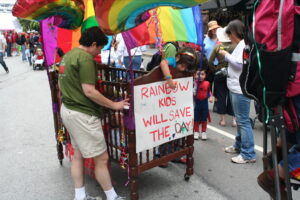
2. Bring wheels, if you can. The only thing nearly as important as food & water are wheels, any wheels, whatever wheels you’re able bring to the parade site & schlepp back home: stroller (no big kid is too big if they can jam into it!), wagon, scooter, tricycle, skateboard, roller blades, bikes: whatever conveyance you can bring that will ease the mile, bring it if you can! I even saw a family with a custom rig once: they attached wheels to the bottom of a crib, and rolled that thing ’til it gave up the ghost half-way up the street. (See picture for actual proof.)
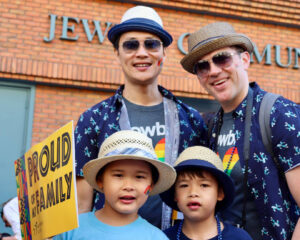 3. Remember sun protection. It’ll be sunny, and sun protection of any & all sorts is in order: wide-brimmed hat; sunglasses; sunscreen. Again: it’s going to be hours in the sun on a fine June day. Don’t overheat or burn.
3. Remember sun protection. It’ll be sunny, and sun protection of any & all sorts is in order: wide-brimmed hat; sunglasses; sunscreen. Again: it’s going to be hours in the sun on a fine June day. Don’t overheat or burn.
4. Attach an ID to the little ones. Whether you go low-tech and write your name (not the kids’ name) and cell phone number on the inside of their little forearms, or you affix one of those ID wristbands on ’em, or you somehow securely attach a laminated card to your kid’s person, be sure there is a super-clear way for someone to know to contact you in the unlikely yet very upsetting event you’re separated. You’ll probably not need it, but if you do, it will be a lifeline.
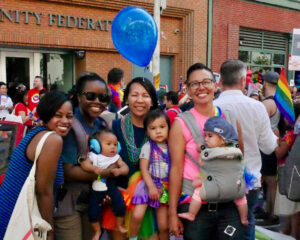 5. Create an exit strategy and end on a good note. Talk together as a family about what to expect from Pride, and how much is going to feel like enough. Reading through Gayle Pitman’s fantastic new book This Day in June would be fantastic prep if your kids are little and haven’t been yet. Agree in advance how you’ll decide when it’s time to go, whether it’s the grown ups or the kids who are supersaturated. It’s a thrilling day, but for years, my own family simply marched up Market Street and then dropped down into BART at Civic Center, as full as we could manage. One of the key tenets of dog training is “End on a good note!” so that the most recent memory is a positive one. That goes for Pride, too.
5. Create an exit strategy and end on a good note. Talk together as a family about what to expect from Pride, and how much is going to feel like enough. Reading through Gayle Pitman’s fantastic new book This Day in June would be fantastic prep if your kids are little and haven’t been yet. Agree in advance how you’ll decide when it’s time to go, whether it’s the grown ups or the kids who are supersaturated. It’s a thrilling day, but for years, my own family simply marched up Market Street and then dropped down into BART at Civic Center, as full as we could manage. One of the key tenets of dog training is “End on a good note!” so that the most recent memory is a positive one. That goes for Pride, too.
A final note, as of 2016: SF Pride, post-Orlando, adopted very strict, airport-style security measures and will be checking everyone who enters Civic Center on the level that you would expect at the airport (e.g., no bags bigger than 18″ x 18″, no alcohol, etc.) Please review their list of what to bring/ not bring – scroll down to “Entry Screening” for details” – so you won’t be taken by surprise when you get to the entry gates.
Together we can make this the Best! Pride! Ever!

